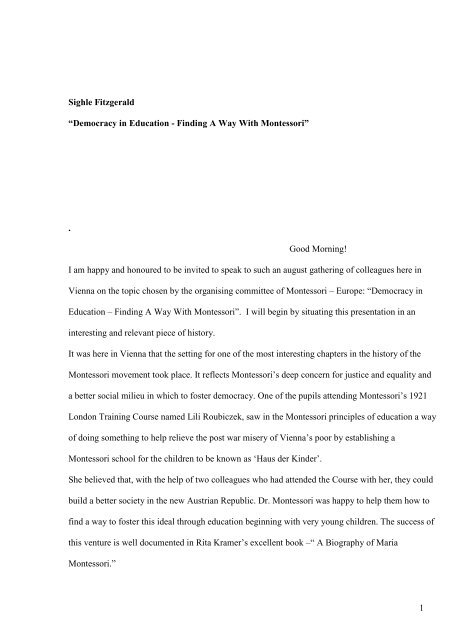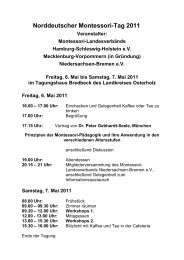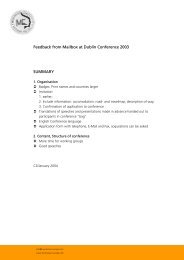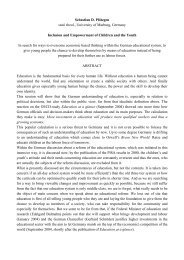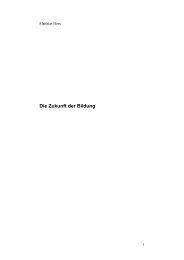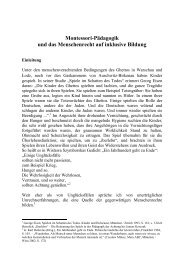Fitzgerald Democracy in Education - Montessori Europe
Fitzgerald Democracy in Education - Montessori Europe
Fitzgerald Democracy in Education - Montessori Europe
- No tags were found...
Create successful ePaper yourself
Turn your PDF publications into a flip-book with our unique Google optimized e-Paper software.
Sighle <strong>Fitzgerald</strong><br />
“<strong>Democracy</strong> <strong>in</strong> <strong>Education</strong> - F<strong>in</strong>d<strong>in</strong>g A Way With <strong>Montessori</strong>”<br />
.<br />
Good Morn<strong>in</strong>g!<br />
I am happy and honoured to be <strong>in</strong>vited to speak to such an august gather<strong>in</strong>g of colleagues here <strong>in</strong><br />
Vienna on the topic chosen by the organis<strong>in</strong>g committee of <strong>Montessori</strong> – <strong>Europe</strong>: “<strong>Democracy</strong> <strong>in</strong><br />
<strong>Education</strong> – F<strong>in</strong>d<strong>in</strong>g A Way With <strong>Montessori</strong>”. I will beg<strong>in</strong> by situat<strong>in</strong>g this presentation <strong>in</strong> an<br />
<strong>in</strong>terest<strong>in</strong>g and relevant piece of history.<br />
It was here <strong>in</strong> Vienna that the sett<strong>in</strong>g for one of the most <strong>in</strong>terest<strong>in</strong>g chapters <strong>in</strong> the history of the<br />
<strong>Montessori</strong> movement took place. It reflects <strong>Montessori</strong>’s deep concern for justice and equality and<br />
a better social milieu <strong>in</strong> which to foster democracy. One of the pupils attend<strong>in</strong>g <strong>Montessori</strong>’s 1921<br />
London Tra<strong>in</strong><strong>in</strong>g Course named Lili Roubiczek, saw <strong>in</strong> the <strong>Montessori</strong> pr<strong>in</strong>ciples of education a way<br />
of do<strong>in</strong>g someth<strong>in</strong>g to help relieve the post war misery of Vienna’s poor by establish<strong>in</strong>g a<br />
<strong>Montessori</strong> school for the children to be known as ‘Haus der K<strong>in</strong>der’.<br />
She believed that, with the help of two colleagues who had attended the Course with her, they could<br />
build a better society <strong>in</strong> the new Austrian Republic. Dr. <strong>Montessori</strong> was happy to help them how to<br />
f<strong>in</strong>d a way to foster this ideal through education beg<strong>in</strong>n<strong>in</strong>g with very young children. The success of<br />
this venture is well documented <strong>in</strong> Rita Kramer’s excellent book –“ A Biography of Maria<br />
<strong>Montessori</strong>.”<br />
1
It is fitt<strong>in</strong>g that we should return to Vienna to try to f<strong>in</strong>d a way to democracy through <strong>Montessori</strong>’s<br />
philosophy of education. It is also timely, as the whole world turns towards democracy to try to f<strong>in</strong>d<br />
a way to peace and harmony among all people regardless of colour, race or creed. This goal was<br />
foremost <strong>in</strong> <strong>Montessori</strong>’s m<strong>in</strong>d at the dawn of the 20 th Century and it seems that her message needs<br />
to be revisited as we approach the centenary of the open<strong>in</strong>g of the first <strong>Montessori</strong> school <strong>in</strong> Rome.<br />
In my research for this presentation, I have found some very <strong>in</strong>terest<strong>in</strong>g views. Some from<br />
<strong>Montessori</strong>’s own words, some from em<strong>in</strong>ent educators and some from my own experiences as a<br />
labourer <strong>in</strong> the field for over forty years.<br />
Professor E. P. Culverwell, Fellow and Senior Tutor, Tr<strong>in</strong>ity College, Dubl<strong>in</strong>, Professor of<br />
<strong>Education</strong>, University of Dubl<strong>in</strong> at the beg<strong>in</strong>n<strong>in</strong>g of the 20 th century, was an ardent admirer of<br />
<strong>Montessori</strong>’s work. In his book “The <strong>Montessori</strong> Pr<strong>in</strong>ciples and Practices”, he outl<strong>in</strong>es the benefits<br />
that accrue from apply<strong>in</strong>g her pr<strong>in</strong>ciples to education:<br />
“The chief importance of the <strong>Montessori</strong> idea lies <strong>in</strong> this, that it may help towards the re<strong>in</strong>statement<br />
of those elements that have been lost from the Greek conception of democracy and thus help to place<br />
education, even the most advanced, on a biological basis, i.e. the scientific study of life, which is<br />
<strong>in</strong>deed, the only basis suited to a democratic State.”<br />
At this time the educational methods were based on the Greek tradition but they had lost all that<br />
was most valuable <strong>in</strong> the Greek conception. In the great world outside the universities the<br />
conception of evolution was revolutionis<strong>in</strong>g thought; Science was show<strong>in</strong>g the way to new<br />
open<strong>in</strong>gs <strong>in</strong> <strong>in</strong>dustry. Above all, democracy as presented by the middle classes was beg<strong>in</strong>n<strong>in</strong>g to<br />
make an effective demand for recognition and some measure of reform could no longer be<br />
delayed.<br />
It was at this time that Dr. Maria <strong>Montessori</strong> devised a system of education <strong>in</strong> closer accord with<br />
the biological pr<strong>in</strong>ciples of child development than any previously practised. This system, <strong>in</strong> its<br />
2
practical application, unites the physiological and psychological laws of which, as educationists<br />
have gradually been f<strong>in</strong>d<strong>in</strong>g out, every rational system of education must take account.<br />
It proceeds along the l<strong>in</strong>es, which the political development of society <strong>in</strong>evitably dictates. It is<br />
said that the type of education always follows the type of society. Therefore, the <strong>Montessori</strong><br />
system, be<strong>in</strong>g founded on the idea of liberty, fulfils an essential condition of democratic<br />
education. It seems to offer some security aga<strong>in</strong>st the danger of democracies, that liberty might<br />
degenerate <strong>in</strong>to licence on the one hand and tyranny on the other. For, as we will see, freedom <strong>in</strong><br />
a <strong>Montessori</strong> environment soon ceases to be licence and becomes self-control, which is<br />
developed to a remarkable extent <strong>in</strong> such young children.<br />
Discipl<strong>in</strong>e and steady application are obta<strong>in</strong>ed without the impetus of rewards or punishments.<br />
The successful outcome of the application of <strong>Montessori</strong>’s vision <strong>in</strong> seek<strong>in</strong>g peace <strong>in</strong> a<br />
democratic society depends on the weav<strong>in</strong>g together of the pr<strong>in</strong>ciples that underp<strong>in</strong> her<br />
philosophy with the specific apparatus designed to assist the child’s understand<strong>in</strong>g of the task <strong>in</strong><br />
hand. To her, the pr<strong>in</strong>ciples were everyth<strong>in</strong>g; the apparatus was only the outcome and expression<br />
of the pr<strong>in</strong>ciples.<br />
Many em<strong>in</strong>ent <strong>Montessori</strong> educators agree that there lies an <strong>in</strong>herent danger <strong>in</strong> referr<strong>in</strong>g to<br />
<strong>Montessori</strong>’s vision as a system or, a method. Professor Culverwell suggests that, we should<br />
consider it a liv<strong>in</strong>g pr<strong>in</strong>ciple.<br />
<strong>Montessori</strong>’s background as a doctor of medic<strong>in</strong>e, prepared her well for her new role as educator.<br />
She queried why so many children were referred to her as be<strong>in</strong>g ill. On exam<strong>in</strong>ation she found<br />
that the problem was not of a medical nature but an educational problem. She reiterated the ageold<br />
maxim that had its roots <strong>in</strong> the cradle of democracy: “There is noth<strong>in</strong>g <strong>in</strong> the <strong>in</strong>tellect that did<br />
not beg<strong>in</strong> <strong>in</strong> the senses”. Aristotle.<br />
Therefore, it is vital that educators should understand the importance of the early years when the<br />
senses are at the height of their sensitivity and the m<strong>in</strong>d is at its greatest absorbency.<br />
3
<strong>Montessori</strong>’s fundamental pr<strong>in</strong>ciple of the importance of the spontaneous manifestations of the<br />
child had been already established and applied <strong>in</strong> education by some psychologists, but it took<br />
her genius to carry it out to its logical conclusion.<br />
To establish a pr<strong>in</strong>ciple is one th<strong>in</strong>g; to determ<strong>in</strong>e the limits with<strong>in</strong> which it is to be applied is<br />
another. Especially is this true <strong>in</strong> education and <strong>Montessori</strong> pursued her goal with relentless,<br />
consistent logic. No one had ever dreamed of limit<strong>in</strong>g the <strong>in</strong>tervention of the teacher to the same<br />
extent. There were many who laid stress on the importance of giv<strong>in</strong>g full scope to the<br />
spontaneity of the child but none had the courage to lay down the revolutionary pr<strong>in</strong>ciple that the<br />
teacher must not <strong>in</strong>terfere with the concentration of the child: (Remember the story of the soap<br />
bubble!). Instead of correct<strong>in</strong>g when a mistake occurs the correction should be left over to a later<br />
time.<br />
What has this to do with democracy you may ask<br />
It is the very bedrock on which the seeds of democracy are sown. In employ<strong>in</strong>g this pr<strong>in</strong>ciple of<br />
education we are fulfill<strong>in</strong>g an essential condition of democratic education. We are giv<strong>in</strong>g the<br />
child the opportunity to exam<strong>in</strong>e his actions, to discover for himself, and with gentle guidance,<br />
lead him to f<strong>in</strong>d a solution to the problem thus fulfill<strong>in</strong>g his profound, unspoken request: Teach<br />
me to do it myself.<br />
In other words we have given him freedom.<br />
Freedom is not an absolute. One cannot<br />
talk about freedom without hav<strong>in</strong>g an understand<strong>in</strong>g of personal dignity and responsibility to<br />
society. Often freedom is def<strong>in</strong>ed as <strong>in</strong>dependence, but we are not float<strong>in</strong>g islands without<br />
connection. There is always a body of water that holds us together. Therefore a def<strong>in</strong>ition must<br />
be based on pr<strong>in</strong>ciples with<strong>in</strong> the context of the societal laws that keep order with<strong>in</strong> our culture.<br />
One cannot have freedom without hav<strong>in</strong>g responsibility to society.<br />
Freedom has been def<strong>in</strong>ed as an absence of restra<strong>in</strong>t or coercion. This is a negative view of a<br />
pr<strong>in</strong>ciple that is valued <strong>in</strong> a democratic society. A more positive perspective is, to view freedom<br />
4
as the ability to make choices. Humans are rational be<strong>in</strong>gs and are not restricted by the same<br />
<strong>in</strong>st<strong>in</strong>cts that guide the behaviour of other species <strong>in</strong> the animal k<strong>in</strong>gdom.<br />
Constra<strong>in</strong>t is viewed as the obstacle that denies freedom. However, constra<strong>in</strong>ts are needed to<br />
form limits and boundaries so that freedom can be def<strong>in</strong>ed. Societal laws b<strong>in</strong>d us but we are also<br />
bound by the characteristics of our m<strong>in</strong>d and personal will. Without personal dignity, freedom<br />
would be viewed as a right and not as a responsibility. For example, a child who views the law<br />
that forbids steal<strong>in</strong>g, as a constra<strong>in</strong>t will use his right to freedom to break the law if he chooses.<br />
However, a child who views that steal<strong>in</strong>g is a law that protects society and keeps order, views<br />
freedom as a responsibility to the community. This child has made a free choice not to break the<br />
laws due to personal dignity. A child who cont<strong>in</strong>ues to steal believes that he is exercis<strong>in</strong>g a<br />
freedom because he views the law as a constra<strong>in</strong>t and not a necessary part of personal freedom<br />
and responsibility. Freedom is a liberty not a licence.<br />
<strong>Montessori</strong> philosophy prescribes a balance between freedom and responsibility for educat<strong>in</strong>g<br />
the person at the various stages of development.<br />
Dur<strong>in</strong>g<br />
the first plane of development the child beg<strong>in</strong>s to make choices <strong>in</strong> the environment and has<br />
extensive use of the freedom he has over his own m<strong>in</strong>d and body. Eventually, the child beg<strong>in</strong>s to<br />
use active reason<strong>in</strong>g rather than <strong>in</strong>ternal impulses to guide his own behaviour. This establishes<br />
personal dignity and self- respect with<strong>in</strong> the child.<br />
Dur<strong>in</strong>g the second plane of development the pr<strong>in</strong>ciple of personal dignity is cont<strong>in</strong>ued with a<br />
greater variety of choices. Together with the foster<strong>in</strong>g of a sense of <strong>in</strong>dependence, the elementary<br />
stage child is exposed to cultural aspects of freedom.<br />
As the children learn about the society around them, they learn about a sense of <strong>in</strong>terdependence<br />
and the responsibility of the <strong>in</strong>dividual needed to ma<strong>in</strong>ta<strong>in</strong> the culture <strong>in</strong> which they live.<br />
5
The matur<strong>in</strong>g personality of the child now understands that behaviour is controlled from with<strong>in</strong><br />
and the <strong>in</strong>dividual understands what is good or bad rather than what society dictates as good or<br />
bad. The child is then able to use judgement and compassion to guide his own freedom.<br />
In order to foster a sense of freedom and responsibility, certa<strong>in</strong> conditions must be ma<strong>in</strong>ta<strong>in</strong>ed<br />
with<strong>in</strong> the classroom and <strong>in</strong> the attitude of the teacher.<br />
Freedom should be regarded as a po<strong>in</strong>t of arrival and not a po<strong>in</strong>t of departure.<br />
Freedom with no responsibility is chaos, anarchy, and licence. Responsibility without freedom is<br />
slavery and oppression. Neither of these situations can help the child create his own <strong>in</strong>dividuality<br />
and <strong>in</strong>dependence. This is the essence of education.<br />
What then do we understand by freedom and responsibility <strong>in</strong> preparation for a democratic<br />
society<br />
How are these presented to the child <strong>in</strong> a <strong>Montessori</strong> school<br />
What is their significance <strong>in</strong> terms of the child’s development<br />
Freedom and responsibility are developed <strong>in</strong> a <strong>Montessori</strong> school by:<br />
Us<strong>in</strong>g the child’s characteristic dispositions, his power of reason<strong>in</strong>g, his desire to know good<br />
from bad, his sense of justice and his sense of compassion and generosity;<br />
: Giv<strong>in</strong>g him a way of understand<strong>in</strong>g the harmony of the universe <strong>in</strong> which man can freely<br />
cooperate with nature, where everyth<strong>in</strong>g is so closely <strong>in</strong>terrelated that the good of the whole<br />
depends on the accomplished task of each of the elements;<br />
: Giv<strong>in</strong>g the child freedom of choice of activities, freedom of movement, freedom to form a<br />
group with his peers when he is ready to do so and to work <strong>in</strong> groups to foster cooperation and<br />
freedom to work outside the classroom to expand his knowledge;<br />
: Mak<strong>in</strong>g him aware of his task as part of the group, especially <strong>in</strong> the care of the environment;<br />
: Discuss<strong>in</strong>g with him, his plans and activities to achieve a particular aim;<br />
6
: Sett<strong>in</strong>g clear limits regard<strong>in</strong>g the environment <strong>in</strong> which he lives and works, hav<strong>in</strong>g due regard<br />
for the rules of society and the right of his peers to work undisturbed.<br />
It is through freedom and responsibility that the child will grow <strong>in</strong>to a fully mature adult,<br />
peaceful and happy with a constructive role <strong>in</strong> a democratic society.<br />
The Role of the School <strong>in</strong> a Democratic Society:<br />
<strong>Montessori</strong> had little doubt that, <strong>in</strong> nearly all respects, the educational system of Athens <strong>in</strong> its<br />
noblest days was someth<strong>in</strong>g worth exam<strong>in</strong><strong>in</strong>g. Schole or school means leisure. By school, the<br />
Greeks meant the place of freedom and opportunity, leisure not <strong>in</strong> the sense of idleness, but<br />
leisure <strong>in</strong> the sense of liberty to be oneself, as we all are <strong>in</strong> our leisure time.<br />
School then accord<strong>in</strong>g to the Athenians is the place where one has leisure to be oneself where the<br />
child has leisure to become itself. It is a view, ideal and practical alike, worthy of the nation that<br />
produced philosophers such as Socrates, Aristotle and Plato.<br />
Maria <strong>Montessori</strong>’s philosophy of education embodied this vision. She appreciated that the role<br />
of the educator was to guide, suggest, <strong>in</strong>spire, direct and correct where necessary <strong>in</strong> a sensitive<br />
and gentle manner for, if the future citizen of the world is essentially a m<strong>in</strong>d and a spirit,<br />
education must be personal and spiritual or it is noth<strong>in</strong>g.<br />
As ‘ <strong>Montessori</strong>ans’ we should be fully aware of the pathway to follow <strong>in</strong> the search for<br />
democracy.<br />
We need to get to the root of our vocation and live up to the ideals set before us by Maria<br />
<strong>Montessori</strong>. We must do as she did. We must ‘Follow the child’.<br />
In his book “Freedom to Learn”, Carl Rogers re-echoes much of <strong>Montessori</strong>’s philosophy. In the<br />
phrase, Teach<strong>in</strong>g is vastly overrated; he encapsulates much of his thought <strong>in</strong> the content of his<br />
book. He emphasises learn<strong>in</strong>g rather than teach<strong>in</strong>g and he focuses on creat<strong>in</strong>g conditions that<br />
7
promote learn<strong>in</strong>g. Self-motivation is the basis for the approach each has taken to learn<strong>in</strong>g. Both<br />
emphasise freedom for the learner.<br />
Both of them renamed the role of the educator from teacher/director, directress to facilitator. The<br />
role of the facilitator was to put the learner <strong>in</strong> touch with learn<strong>in</strong>g situations relevant to his<br />
personal needs.<br />
The Role of the Facilitator <strong>in</strong> a Democratic Society:<br />
The primary purpose of education is to br<strong>in</strong>g out what is <strong>in</strong> the m<strong>in</strong>d. Instruction is only an<br />
<strong>in</strong>strument of education and the misuse of the <strong>in</strong>strument may even ru<strong>in</strong> the material upon which<br />
it works.<br />
Essentially education is not a process of <strong>in</strong>sertion or <strong>in</strong>trusion or <strong>in</strong>struction but of extrication. If<br />
a child’s m<strong>in</strong>d i.e. the develop<strong>in</strong>g m<strong>in</strong>d of man were likened to a portmanteau, education is not<br />
pack<strong>in</strong>g the portmanteau as we commonly suppose, but unpack<strong>in</strong>g it.<br />
We have to look at the problem biologically because it is a biological problem, a problem <strong>in</strong> the<br />
development of a liv<strong>in</strong>g be<strong>in</strong>g.<br />
<strong>Education</strong> is the provision of an environment, no more and no less. It creates noth<strong>in</strong>g whatever.<br />
Whenever we suppose that education has created someth<strong>in</strong>g, it has only provided the<br />
environment, the opportunity, and the stimulus for the development of what was already<br />
potentially there.<br />
Many people have supposed that <strong>Montessori</strong>’s stress on the provision of an environment is a<br />
phrase that reduces the function of education unduly. But if we beg<strong>in</strong> by ask<strong>in</strong>g ourselves what<br />
mank<strong>in</strong>d is, we shall soon see that the provision of an environment for the whole of man <strong>in</strong> his<br />
young state is a great and complex task. S<strong>in</strong>ce the body of man is animal, it shares all the<br />
environmental needs of animals. But s<strong>in</strong>ce man is more than an animal, he has special<br />
environmental needs and susceptibilities of his own.<br />
8
Our difficulty is to appreciate the importance of environment, and therefore of its provision that<br />
we call education and at the same time to realise that it creates noth<strong>in</strong>g.<br />
Life grows and develops from with<strong>in</strong>, <strong>in</strong> virtue of what it is.<br />
If the body is what it eats and digests so too is the m<strong>in</strong>d what it absorbs, reta<strong>in</strong>s, digests, alters,<br />
forgets and comb<strong>in</strong>es just as the body does. Every m<strong>in</strong>d does this <strong>in</strong> its own way for its own<br />
purposes, unlike every other m<strong>in</strong>d that ever was or ever will be, just as the body does.<br />
This is the mean<strong>in</strong>g of <strong>in</strong>dividuality or personality and this it is what the educator must decide,<br />
first to recognise, then to value and lastly to provide the right environment for education to do<br />
what it should and must do.<br />
In former times the English word ‘to educate’ was a synonym for ‘to govern’. Perhaps it is time<br />
to return to this <strong>in</strong> order to understand the relationship between education and democracy. As<br />
Amy Gutmann, Director, Programme <strong>in</strong> Political Philosophy, Pr<strong>in</strong>ceton University states: “<br />
<strong>Education</strong> entails governance whether of the young by the old, the ignorant by the<br />
knowledgeable, the foolish by the wise or the relatively powerless by the powerful. The most<br />
defensible conception of democratic education is democratic <strong>in</strong> both its ends and its means. The<br />
end of democratic education is to create democratic citizens, people who are will<strong>in</strong>g and able to<br />
govern their own lives and share <strong>in</strong> govern<strong>in</strong>g their society. And the means of educational<br />
governance are a complex balanc<strong>in</strong>g of parental, professional and public authority, a<br />
comb<strong>in</strong>ation consistent with the political ideals of representative democracy, which support the<br />
basic liberties of all adult members of a society.” <strong>Montessori</strong> would agree whole-heartedly!<br />
9


